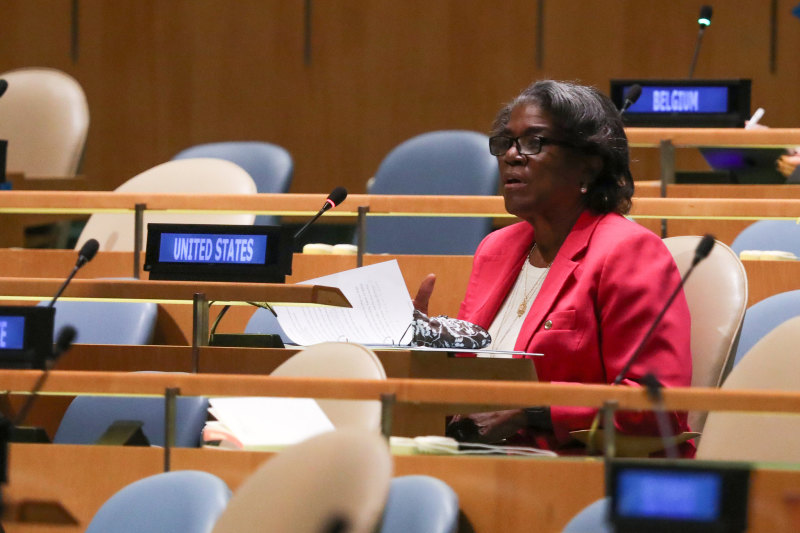
President Joe Biden's newly-appointed UN Ambassador Linda Thomas Greenfield doubled down on anti-American Chinese talking points last Wednesday as per reports.
Townhall reported that Thomas-Greenfield raised during the National Action Network event for Al Sharpton that racism is "woven into" the United States' founding documents. The report cited a tweet of Grabien Media Founder Tom Elliot that included Thomas-Greenfield's video taken during the said event that was viewed 1.2M times.
"Biden's UN ambassador, Linda Thomas-Greenfield, tells the National Action Network that if America's going to join the UN's Human Rights Council, we must acknowledge our own failures: 'White supremacy is weaved into our founding documents and principles'," Elliott tweeted on Thursday.
In the video, Thomas-Greenfield emphasized the virtue of humility in admitting America's weaknesses as the country pushes for "a better future."
"We immediately reengaged with the Human Rights Council and have announced our intention to seek election to that body so that we can advance our most cherished democratic values around the globe. Of course when we raise issues of equity and justice at the global scale we have to approach them with humility," Thomas-Greenfield raised.
"We have to acknowledge that we are an imperfect union and have been since the beginning. And every day we strive to make ourselves more perfect and more just," she added. "In a diverse country like ours, that means committing to do the work. It means learning and understanding war, about each other. It means engaging trailblazing groups like yours to teach, grow, to improve. It means not forgetting our past or ignoring our present but keeping both firmly in mind as we push for a better future."
Thomas-Greenfield shared her personal and her own ancestry's experience--her great grandmother--of slavery due to "white supremacy" and cited the many instances of racism experienced by many minorities including the Latino Americans, Muslim Americans, Asian Americans, and Jewish Americans in the United States that has aggravated due to the pandemic along with bullying.
She said these are the very reasons the Biden Administration has made efforts to address discrimination in the country. She revealed that she spoke of these experiences in the United Nations General Assembly and intends to make it the focus of her term there.
Biden's UN ambassador, Linda Thomas-Greenfield, tells the National Action Network that if America's going to join the UN's Human Rights Council, we must acknowledge our own failures: "White supremacy is weaved into our founding documents and principles" pic.twitter.com/bYc5SyWkE1
"” Tom Elliott (@tomselliott) April 14, 2021
Townhall added that Thomas-Greenfield's "powerful" message actually echoed the sentiments of China who "lectured the U.S." during its meeting in Alaska with U.S. Secretary of State Antony Blinken regarding the Uyghur genocide issue when the U.S. are "slaughtering black people" and are failing in dealing with its own "human rights issues" that allegedly led to the Black Lives Matter movement.
In a prior report, Townhall explained the U.S. left the Human Rights Council in 2018 under the administration of former President Donald Trump not to "retreat from human rights commitment" but to disassociate from a "hypocritical and self-serving organization that makes a mockery of human rights."
Biden reversed in February what Trump did by rejoining the UN Human Rights Council as an "opportunity to speak in the Council" and "introduce resolutions" even though it recognizes that "the Human Rights Council is flawed" and in need of reform especially in line with its anti-Israel policies.
She said racism is not a problem of the person who experiences it but the "problem of the racist" and "of the society that produces the racist."
In the transcript of her interview with Face The Nation on Sunday published by CBS News, Thomas-Greenfield clarified that what she said during the National Action Network event was not a criticism of America but rather an acknowledgment of its history and "imperfections" and that she being a UN Ambassador now is proof of "what our country is about."
"I think we're being tremendous leaders, our country is not perfect, but we continue to perfect it. Those imperfections are part of our history and we have to talk about them. It's- it's our strength that we can talk about our imperfections to the world and call out other nations for those same imperfections. So it's not a- a criticism. It's an acknowledgement of our history. It's an acknowledgement of where we started. But we need to look at where we've come," she stated.



























